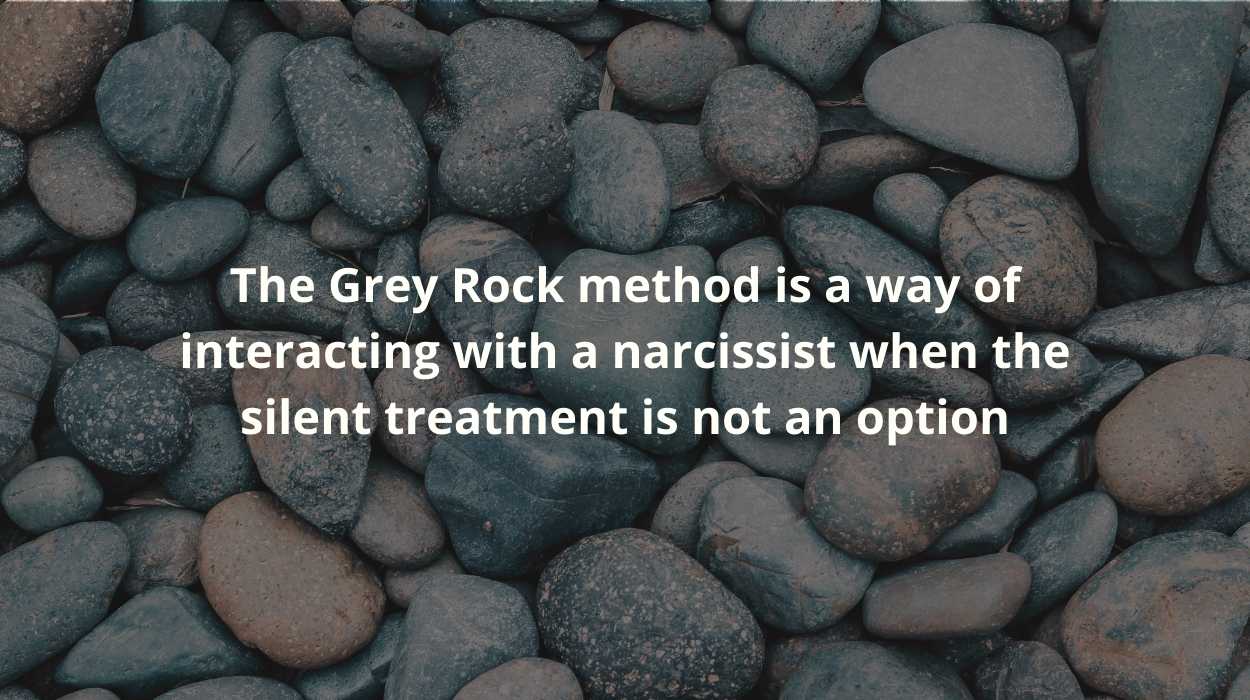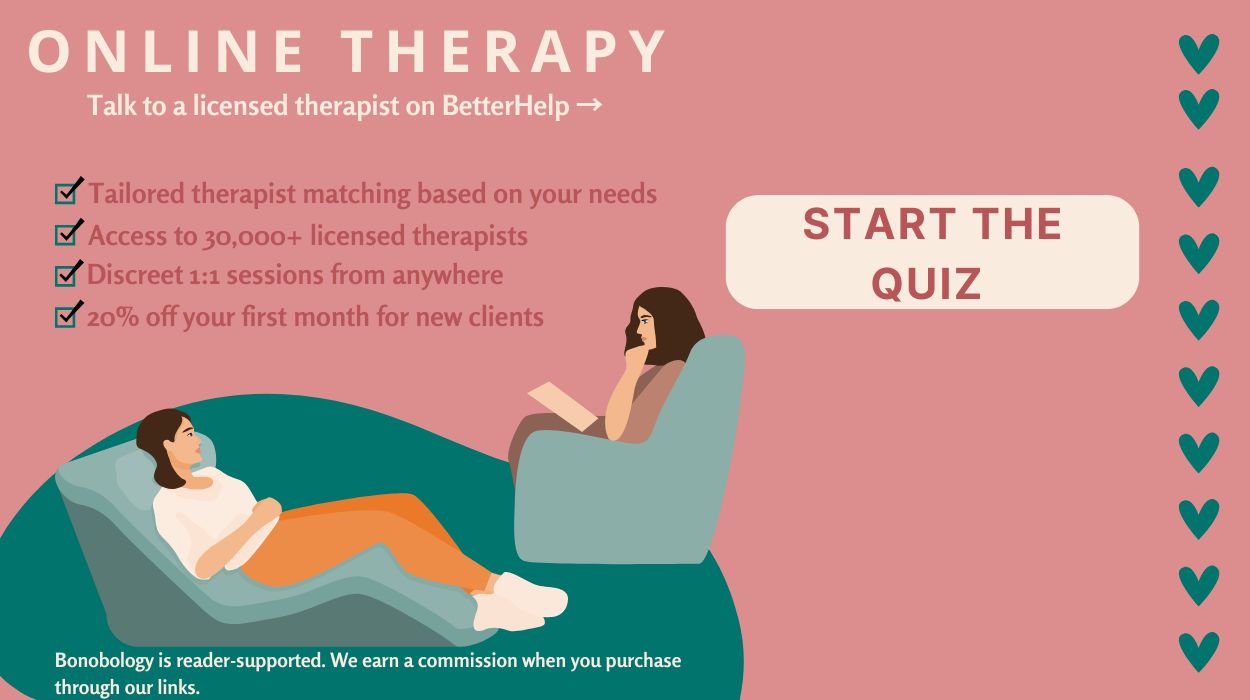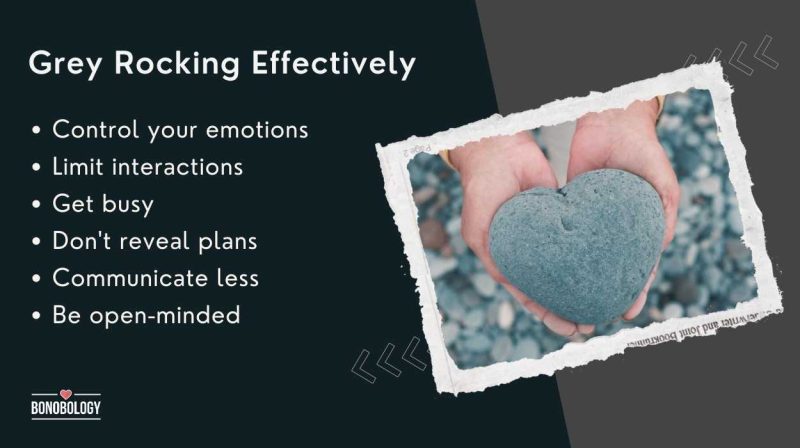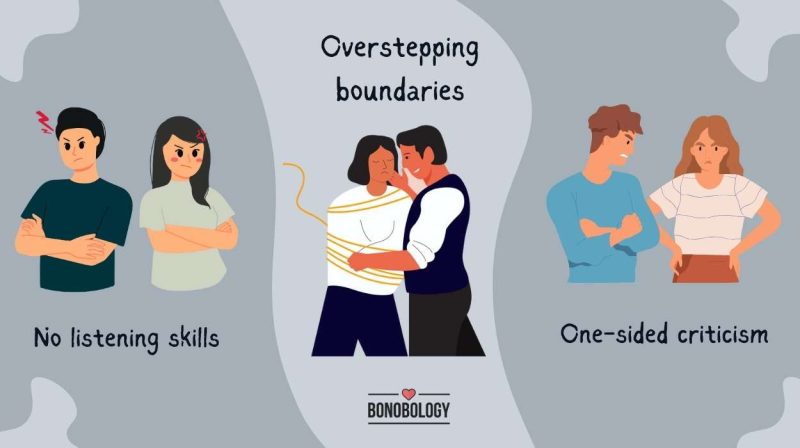Picture a grey rock. Ever noticed how dull and lifeless it is? And does it have any function? Well, no! It simply lies on the ground, and well, that’s it. The grey rock method simply mirrors this very essence. Just like a grey rock, a person using the method evades notice and avoids toxic people.
What does it mean to grey rock someone? Well, in this method, a person who is being manipulated appears as indifferent and non-reactive as a grey rock. A grey rock doesn’t feel pain or bleed when it’s messed with. So, through this method, a person who has felt mistreated or abused by a narcissist can appear disinterested and passive, just to shift the narcissist’s focus away from them. Eventually, the narcissist mends their ways.
How does it impact the mental health of a narcissist? In this article, we’ll try and explore the many facets of grey rocking a narcissist, with the help of California-based psychiatrist and cognitive behavior therapist Dr. Shefali Batra (MD in Psychiatry), who specializes in counseling for separation and divorce, breakup and dating, and premarital compatibility issues. We’ll also find out in which scenarios grey rocking can be effective and look at a few grey rock responses examples to help us go through our relationships smoothly.
What Is The Grey Rock Method?
Table of Contents
So, the grey rock method is simply a way to stop a person suffering from narcissistic personality disorder from getting your attention. It’s also a method of blocking toxic people. Dr. Batra explains, “The grey rock method is a relatively recent term. It surfaced in the past decade, although it’s surely been used earlier too. It is based on the premise that narcissists do what they do in order to gather attention. If they cease to get attention for their toxic behavior, which in essence is the emotional reaction, the behavior stops. The idea is that the narcissistic supply is cut off. And then there is no interest in expressing that behavior toward the victim.”

And when is this method most effective? As Reddit user Chained_Escapist rightly mentions, you can cut off a narcissist when that person is a stranger. But what if the narcissist is someone you know? What about abusive romantic partners, or people you can’t escape, such as your coworkers or your boss? It seems grey rocking the person is the best way to deal with such a situation.
But how does the grey rock psychology work and how different is grey rocking from stonewalling (or a narcissist’s silent treatment to anyone they wish to manipulate)? Are there any differences between the two? We’ll explore the two aspects in detail:
Stonewalling vs. grey rock
So, while grey rocking, or grey walling, is a perfect response to a narcissist or a toxic person, stonewalling is what narcissists do to gain attention. The grey rock method differs from stonewalling in the sense that:
- It helps you ignore a narcissist or a toxic person: When you grey wall a narcissist, you don’t let them get to you, as you’re passive toward them. For instance, when a narcissistic partner expects you to make their schedule a priority and starts arguing, you can leave the room, saying “Well! Whatever.” Stonewalling, on the other hand, is when the narcissist shuts you down completely, using the silent treatment, to manipulate you or punish you for not working according to their whims
- It prevents you from absorbing the abuse: Grey walling, in avoiding a narcissist or a toxic person, helps you prevent abuse. Stonewalling, on the other hand, is all about abuse, as it helps a narcissist or an emotionally abusive person use your emotions to get what they want
- It occurs when you’re hurt by a narcissist: You grey wall someone when you’re hurt by their actions, not because you wish to hurt someone. When you stonewall someone, your motive is to hurt the other person. It’s a chain reaction of the deep-seated hurt that a narcissist may have experienced in some other scenario
Related Reading: 11 Warning Signs Of A Toxic Relationship
As a Quora user, Richard Persen, points out, people who resort to stonewalling are the ones (especially narcissists) who have made things worse trying to solve them in the past. So, they resort to the silent treatment to avoid any situation that doesn’t work to their advantage.
How the method works with narcissists
Dr. Batra states, “It’s important to realize that there’s a difference between withdrawing completely from the narcissist and engaging, but not responding. Withdrawing completely is also pathological because it makes the narcissist more powerful. They then know that they have an effect on you.
“For those who are withdrawing to preserve their own sanity and mental health, it’s a valid action. But, nonetheless, it is still not called the grey rock method. Grey rocking is an active process.” Thus, grey rocking doesn’t involve cutting all ties with a narcissist, as that may make them feel they are winning. Grey rock meshing, in fact, confuses narcissists.
Related Reading: Exposing A Narcissist – What You Should Know
So, what happens when you ignore a manipulator? By showing them you’re not interested in their mind games, or by keeping yourself away from manipulative situations that they wish to get you into, you actually help narcissists check their behavior. In the long run, grey rocking helps a narcissist recover, as the less attention they get, the less are their chances of trying to get attention. They eventually lose interest in manipulating you.
5 Scenarios Where You Can Use The Grey Rock Method To Protect Yourself
So, now that you know what grey rocking is and how it’s constructive and not manipulative, we’ll look at some grey rock method examples. Here are a few scenarios where this method can actually help you protect yourself.
1. When someone intentionally humiliates you
So, you’re at a party, and your narcissistic friend calls you a ‘sissy’ for not wanting to stay back late at the party. You can’t reason with them that you have an early morning meeting tomorrow. Her Instagram feed is more important to her, and she throws a fit! She doesn’t even shy away from attacking your self-esteem. So, how do you grey wall her?
Dr. Batra says, “There are many ways to react to this. One of them is to go with the flow and just kind of let it pass. You can also make a joke out of it. Or you can say something like, “Oh yes, thanks for bringing it out. I need to change and I will.” This way you are not getting worked up, which is what a narcissistic person would want.”
2. When someone tries to control you
Let’s face it! A control freak partner can leave you feeling stifled and at a loss of your agency. After all, with someone else back-seat driving your life, it’s easy to feel like you’re losing all control. In a situation like this, it becomes imperative to figure out how can you deal with a controlling spouse.
You can stonewall them by avoiding participating in the conversation or asking them questions. Dr. Batra explains, “Just don’t engage and keep doing what you’re doing. Pretend you didn’t hear them. And if they say it again, just say, “Oh, excuse me, what did you say?” It will be very difficult for them to repeat it because it’ll be kind of embarrassing.”
Related Reading: 21 Warning Signs Of A Controlling Husband
3. When you’re being guilt-tripped
Guilt-tripping in relationships is one of the favorite tools of a narcissist. So, you chose to go for a vacation to Bali with your friends but were guilt-tripped by your husband when you got back? He thinks you should ditch your girls’ nights too and should focus on your family. Guess it’s time to play the grey rock method with your husband.
Likewise, you may be guilt-tripped by your parents for choosing to stay away from your hometown to further your career. Whenever you think your conversations start to veer toward such topics, avoid them by saying you’re busy with something or that you’ll talk about it some other time.
4. When someone gaslights you
Dr. Batra explains, “When a narcissist is gaslighting you, it usually means they are questioning your reality.” So, should you play the grey rock method with your husband when he doubts your memory or your credibility in tricky situations that were created by him? Hell, yes! So, how do you manage a gaslighting sociopath?
“Pretend to be surprised and clarify your stand. Use the broken record technique, that is, keep repeating yourself so the other person views you as a schoolteacher and them as retarded children who don’t understand what you’re saying. Their goal is to gaslight you. And if you’re not going to get lit, you are the winner!,” Dr. Batra adds.
Related Reading: Gaslighting In Relationships – 7 Expert Tips To Identify And 5 Ways To End It
5. When you’re being isolated from friends or family
A prominent tool used by a narcissistic partner or an abusive person is to isolate you from your loved ones. That way, you won’t have someone to fall back on when things go wrong between the two of you. Likewise, they can have all your attention and can make you do as they please if you don’t have friends or family (or any third person) to share your feelings with.
Grey rocking them is the best approach to deal with such people. Don’t reveal much about your plans. Ignore their reactions.
How To Use The Grey Rock Meshing Effectively — 7 Tips
Now that you have a clear picture of what grey rocking is, with the help of the grey rock method examples mentioned above, you must be wondering how to use this in your daily life. This section will throw light on how to make the grey rock method effective. Be it grey rock method co-parenting or using the grey rock method with a spouse, it can get tricky if you don’t handle things the right way. So, want to take a look at a few grey rock responses examples? Here are 7 tips to use the grey rock meshing effectively when you see signs someone is trying to provoke you:

1. Limit the time spent with the person
To save yourself from narcissistic abuse, it’s important to limit your interactions with a narcissistic person. If it’s a narcissistic parent, try moving to a new city. If it’s a narcissistic coworker, schedule your lunch or tea break after they are done with theirs. Know their routine and avoid bumping into them.
2. Control your emotions
Narcissistic abuse can be emotionally draining. Dr. Batra advises, “Keep your emotions in check. Remember that this person exists to gaslight you and that you will not be lit.” In fact, controlling your emotions is necessary so that the narcissist cannot use them against you.
For instance, a narcissistic parent may use your childhood memories to control you, which may then lead to emotional and psychological abuse. Don’t fall into that trap. Avoid any emotional response and practice emotional detachment.

3. Communicate sparsely
So, it’s impossible to avoid your narcissistic boss or sibling, and you have to interact with them daily. How can you handle this situation without getting affected? As Dr. Batra says, “Don’t get into a battle that is not yours to fight. You don’t have to defend yourself or be defensive. You just have to pretend to play dumb and not react.” Here’s what you can do in such cases:
- Avoid eye contact
- Keep your conversations brief and respond with one-word answers, such as “Okay” or “Ahaan”
- Don’t explain yourself or start an argument
- Don’t respond to the manipulative things they say
- Talk about neutral tropics, such as the weather or a movie
- Change the subject often if they start getting agitated. In fact, use your imagination or the surroundings to change the topic of your conversations
- Some grey rock method texting tips include avoiding texting till the end of your work day or texting using one or two words
Related Reading: 8 Common “Narcissistic Marriage” Problems And How To Handle Them
4. Be open-minded
It’s important to understand such situations from the narcissist’s perspective too. Don’t be quick to judge or blame yourself for reacting in a particular way. Dr. Batra adds, “Understand why the narcissistic person behaves in a particular way. Know that it’s not to put you down. It’s not about you but about them. So, pity them for their motives and let it go.” Most importantly, remember that the narcissist may be healing from emotional abuse. Consider their mental health.

5. Don’t reveal plans or personal information
So, your narcissistic husband keeps ‘getting sick’ whenever you plan an office trip, so that he can ruin your plan? Try not revealing your plans once, and see if it gets better. In fact, narcissists look for drama. So, don’t give an abusive person the chance to create drama by bumping into you where you would rather not see them.
Related Reading: 21 Signs Of A Narcissistic Husband And How To Cope
6. Get busy with something else
The moment you realize the narcissist is trying to drag on a conversation to get you to react, disassociate yourself from the situation. If it’s a friend, say you have a personal emergency to attend to and walk away. If it’s a coworker, say you have some urgent mails to reply to.
7. Don’t always grey rock: Seek professional help

So, what happens when you cut off narcissistic supply? The person suffering from narcissistic personality disorder either changes their toxic behaviors or gets enraged that their abusive tactics aren’t working on you. What should you do when a manipulator loses control? When all your grey rocking tactics fail or you see that the narcissistic or abusive person is not healing, take more serious steps. Don’t keep ignoring them if you see signs of immediate danger. After all, this method isn’t a long-term solution.
Related Reading: Romantic Manipulation – 15 Things Disguised As Love
It’s always better to help the manipulator get psychological counseling to address their mental health. In drastic cases, such as physical assault or domestic violence, get social support and consult legal authorities. Here are some situations where this method should not be encouraged:
- If someone harasses you sexually or psychologically
- If you’re in an abusive relationship where your partner resorts to physical violence or aggressive behavior
- If an ex tries to manipulate your present relationship
- If an ex threatens to commit suicide or harm themselves physically
- If you feel unsafe in the presence of the abuser and feel they can get violent
- If the person who’s been grey rocked becomes hysterical or shuts down completely
If you are in immediate danger, call 9-1-1. For anonymous, confidential help, 24/7, please call the National Domestic Violence Hotline at 1-800-799-7233 (SAFE) or 1-800-787-3224 (TTY).
Key Pointers
- The grey rock method is a way to avoid being manipulated by abusive people or narcissists by appearing disinterested or avoiding interaction when someone tries to get a reaction out of you
- When you look at stonewalling vs grey rock, the two differ widely, in the sense that grey rocking has a constructive objective. Stonewalling (the passive aggressive narcissist silent treatment), on the other hand, is aimed at hurting a person
- Blocking a narcissist works wonders when you’re being gaslit, guilt-tripped, or deliberately humiliated by an abusive person
- The method is effective when you maintain emotional distance, avoid eye contact, avoid much interaction with the abuser, don’t reveal too much information about yourself, and adopt some grey rock method texting tips
- It should not be used when you see signs of severe mental health issues, harassment, self-harm, or domestic violence. You should consult a mental health professional in such cases
Thus, the grey rocking technique is an effective tool to handle abusive people and control their manipulative behaviors. We hope you’ll now be able to identify situations apt for grey rocking and manage emotional manipulation, public humiliation, and other negative behavior that narcissists often showcase. But make sure you don’t turn into another monster or manipulative person and harm a narcissistic person psychologically. So, grey rock, but don’t over-do it!
No Contact With A Narcissist – 7 Things Narcissists Do When You Go No Contact
Empath Vs Narcissist – The Toxic Relationship Between An Empath And A Narcissist
Your contribution does not constitute a charitable donation. It will allow Bonobology to continue bringing you new and up-to-date information in our pursuit of helping anyone in the world to learn how to do anything.























Featured
13 Signs Of A Hot And Cold Relationship & How To Break The Pattern
21 Subtle Signs You’re Not Really In Love With Your Partner
I Hate My Girlfriend: Why You Feel This Way And What To Do
When Health Challenges Affect Your Relationship Dynamics
5 Harsh But True Signs He’ll Never Marry You
21 Signs That You Are Alone In A Relationship
11 Situationship Red Flags You Should Know About
Why Do I Get Attached So Easily? 9 Possible Reasons and Ways to Stop
How To Respond To DARVO: Expert Lists 7 Strategies
What Is Fexting, And Why Is It Bad For Your Relationship?
Are Narcissists Capable Of Love?
11 Prominent Male Narcissist Traits to Watch For
Why Does My Girlfriend Hit Me? Expert Shares 11 Possible Reasons And Ways To Cope
How Does A Narcissist React When They Can’t Control You?
“My Anxiety Is Ruining My Relationship”: 6 Ways It Does And 5 Ways To Manage It
13 Distinctive Traits Of Female Narcissists Revealed
Recognizing The 13 Red Flags Of A Controlling Relationship
What Are The Examples Of Narcissistic Behavior In A Relationship?
11 Signs He Is Forcing Himself To Love You
21 Signs The Relationship Is Over For Him and How To Deal With It